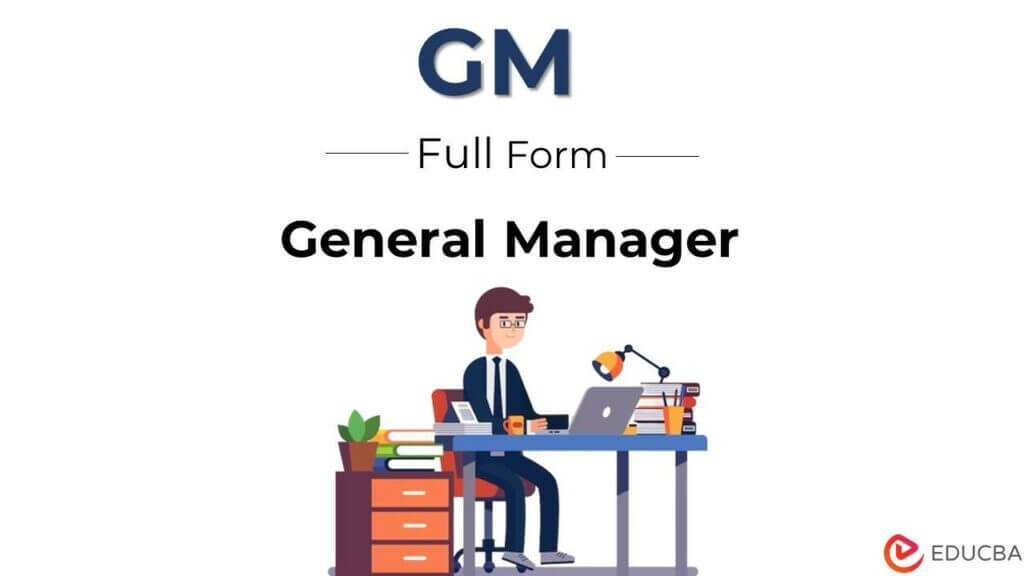Updated February 20, 2023
GM (General Manager)
The full form of GM is General Manager. GMs play a critical role in the success of an organization. As the highest-ranking manager in an organization, GMs oversee operations, manage finances, and make critical decisions that impact the organization and its stakeholders. They are also responsible for developing and implementing the organization’s strategic plan and operating personnel and ensuring that quality standards are met.
Being a GM requires a unique combination of leadership, strategic thinking, financial understanding, communication, and problem-solving skills. This role is challenging but also offers a high degree of autonomy, responsibility, financial rewards, and opportunities for professional development. In this blog, you will explore the key responsibilities, powers, qualifications for a GM, and the benefits of being a GM.
What is a General Manager (GM)?
A General Manager (GM) is a senior executive responsible for managing an organization, department, or division. They oversee the day-to-day operations, achieve the set goals, and make critical decisions that impact the company. A general manager (GM) is usually the highest-ranking manager in an organization and reports directly to the CEO or the Board of Directors.
Key Responsibilities of a General Manager
The responsibilities of a GM are given below:
1. Strategic Planning and Decision-Making
The GM is responsible for developing and implementing the organization’s strategic plan, which involves setting goals, determining resources needed, and creating action plans to achieve those goals. They also make important decisions that impact the organization, such as approving budgets, determining resource allocation, and overseeing major projects.
2. Financial Management
The GM is responsible for managing the organization’s finances, including creating budgets, managing cash flow, and ensuring that it operates within its financial constraints. They also develop financial projections and monitor performance against the budget.
3. Operations Management
The GM is responsible for overseeing the organization’s day-to-day operations, including managing personnel, managing resources, and ensuring that processes and procedures are followed. They also ensure that quality standards are met and customer needs are met.
4. Human Resource Management
The GM manages the organization’s human resources, including hiring, training, and retaining employees. They also oversee the development of HR policies and procedures and ensure that the organization complies with labor laws and regulations.
5. Customer Relationship Management
The GM is responsible for developing and maintaining positive customer relationships, including managing customer complaints and ensuring customer satisfaction. They also develop and implement customer service strategies and policies.
Skills and Qualifications of a General Manager
After knowing the full form of GM and its responsibilities, let us understand the required skills and qualifications of a GM.
They are as follows:
1. Leadership
A GM must be an effective leader and be able to motivate and lead a team toward a common goal. They must also be able to make tough decisions and provide direction and guidance to their team.
2. Strategic Thinking
A GM must be able to think critically and strategically to develop and implement long-term plans for the organization. They must also be able to assess the impact of their decisions on the organization as a whole.
3. Financial Acumen
A GM must have a strong understanding of financial management, including budgeting, forecasting, and analysis. They must also be able to make sound financial decisions that impact the organization’s bottom line.
4. Communication
A GM must have excellent verbal and written communication skills and communicate effectively with employees, customers, and stakeholders.
5. Problem-Solving
A GM must be able to promptly and effectively identify and solve big and small problems. They must also be able to develop creative solutions and make difficult decisions.
Benefits of Being a General Manager
Some of the benefits of being a GM are:
1. Career Advancement
Being a GM offers excellent career advancement and leadership development opportunities. A GM can progress to higher levels of management within an organization or even move on to become a CEO.
2. Autonomy and Responsibility
As the highest-ranking manager in an organization, a GM has a high degree of independence and responsibility. They have the authority to make crucial decisions that impact the organization and are held accountable for their actions. This level of responsibility can be both rewarding and challenging.
3. Financial Rewards
General Managers are typically well compensated, with salaries commensurate with their level of responsibility and experience. Many GMs also receive bonuses, stock options, and retirement plans.
4. Impact on the Organization
A GM has the opportunity to make a significant impact on the organization and its stakeholders. They can shape the organization’s culture, improve processes and procedures, and drive growth and success.
5. Opportunities for Professional Development
A GM is continuously challenged and has the opportunity to learn and grow constantly. They have access to training and development programs. They attend industry conferences and events to stay up-to-date on industry trends and best practices.
Conclusion – Full Form of GM
In conclusion, General Managers play a crucial role in the success of an organization. With their high degree of autonomy, responsibility, and decision-making authority, GMs can significantly impact the organization and its stakeholders. To be effective in their role, they must possess a unique combination of leadership, strategic thinking, financial understanding, communication, and problem-solving skills. So, now you know who a GM is. Hope this article has helped you understand the full form of GM and the various facets related to it.

